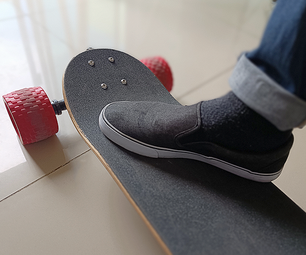Introduction: Make a WiFi Camera Bird Box - Cheepy Cheap!
Build your own WiFi-Camera-enabled Bird Box, cheaply, and quickly. Perfect for an After-School/Club/Scouts project or a weekend DIY build. Watch birds build nests, raise young, and before long - the young fly leave the nest!
Although camera kits do exist for bird boxes, they have a few limitations - they are usually wired (i.e. not WiFi) and if they are, they are at least 2-3x more expensive than this - and don't 'scale up' effectively: You have to have one camera to one next box, it'll cost a fortune, if you wanted to observe multiple boxes. (With that said, if you do still want to install permanent 1:1 camera:box, then this is still much cheaper! (see Appendix 1)).
This 'bird cam variation' uses 3ml Syringe Tubes to create nifty little rainproof 'spy holes' to insert a WiFi endoscope in/out of, with minimal disruption to the nesting birds. The pictures and video can be viewed on any smartphone.
Endoscopes are used to inspect drains, under floors, doing car repairs - you name it. Consequently, they are made at higher volume than bird cams, and hence are cheaper (and arguably much more compact). Indeed, once the season is over / when not in use, you still have a useful device. So I think this is an effective way to get started, and if you really become obsessed, sure - upgrade to the fancy kit ;o)
PS - Images are not from me. I'm just at the start of the season, and will update when I get pics...
Safety - Please note, I have shown pictures of my toddler using a drill, glue, etc. He is supervised, but you remain responsible for evaluating the risks to the child/ren in your care. I cannot accept any responsibility.
Supplies
Essentials:
Bird Box (x4 bargain): https://amzn.to/3cbFc30
(Can get larger bulk quantities for Schools, but 4 seems a good starter pack!)
WiFi Endoscope: https://amzn.to/2VgWupq
(One endoscope can be taken round multiple boxes, where accessible).
Drill: https://amzn.to/2VfQAEJ (in case interested).
3ml Syringes: https://amzn.to/3bXPkfH (suggested size).
10mm Drill Bit: https://amzn.to/37WzKxj (suggested size).
Mini FIles: https://amzn.to/2VhyK4u
Cost Comparison:
WiFi Bird Boxes c.£80+
This Build: Box c.£3.5 each, WiFi Cam c.£25-£30, Syringes c.£0.25 each. Total: c.£35.
Step 1: Upgrading the Bargain Box
The Box shown is a fair price (around £3.5/box). It's hard to argue with this, when you consider you'd have to buy screws, hinges, paint, nails, and drill and assemble. So I really think that this is a good starter project - especially for schools, where many kids want to have a go, you can buy a large quantity to install in a number of locations.
However, if you really want to make one from scratch, this looks good:
https://www.rspb.org.uk/fun-and-learning/for-famil...
I 'upgraded' this bird box with some dowel on the front, so birds could perch and check it out. I'm not sure how much this improves the chances of nesting, but it'd seem plausible to want to not fly into a hole without looking, right? We shall see...
Teachers Note: The hole size also influences what species will nest, so good around and enlarge/reduce if you want to experiment further as part of STEM projects, etc.
Update: Following a helpful comment below, if you are in N.America you may wish to not put this peg in, if you don't want to attract certain invasive species. Obviously it'd your call though - kinda fun to try it and see!
Step 2: Preparing the Syringe (Camera Mount)
I used a 3ml syringe, which has a 10mm OD and 8mm ID.
The camera has an OD of 7.75mm so fits nicely into the tube. It's coincidence, but works a treat.
Cut in two, around the '2.5ml' region - or - [10mm + the thickness of your bird box wood walls].
If you find it a bit tight, give it a stretch with some pliers.
Step 3: Centre the Camera Mount
I 'hovered' the camera in the approximate middle to check the alignment. This turned out to be 4.5mm from the back of the (roof) of the bird box, and naturally dead-centre.
Taking a 10mm drill bit, I drilled the hole. Note: first I drilled perpendicular to the roof, and then once 'established', I manoeuvred the drill to be vertical from the floor of the bird box.
Lastly, I gave the drill a slight 'wiggle' to allow a not too tight fit.
I inserted the Syringe piece from underneath, as shown.
Step 4: Align the Camera
I removed the 'collar' of the camera (this is a screw fitting for other attachments, not needed here), to give easy passage in the tube. If it is tight, use a small file, or a bit of studding to free up the hole.
Step 5: First Video Test
Follow the instructions on the endoscope to get images, as above.
---
Safe to say, rotating the camera to get a good angle is easy.
But do pay attention to the angle (x and y axis), and gently twist the syringe into the best position.
Don't glue it yet, but get happy with the set-up.
Step 6: Rain Proof Bung
I realised if I made a 'viewing port', I'd need to create a reliable water-tight bung, that was still easy to remove. This might sound easy, but I can assure you from my time as an engineer at Dyson, that rubber seals are not trivial. So why 'reinvent the wheel' when there was a great one in the Syringe. Indeed, this was the initial inspiration, and as it fit the endoscope - it seemed to lucky to just ignore, so I wrote up the Instructable!!
Anyway, using a scalpel or pliers, cut the plunger in half, and re-insert the seal end into the syringe to stop water dripping on your chicks when not viewing with the camera.
Step 7: Lights, Camera - ACTION!
So with my rubber ducky mounted on some blocks to what I anticipated to be the next height, I checked the camera function, focus, etc. I was very impressed, and as you can see the focal point is good.
Step 8: Glue in Place
Now you have the syringe 'camera mount' all set, carefully remove the camera.
Take some superglue and fix in place. If you have a lot of space that needs 'filling', use some woodglue, or even Sugru, as shown. Indeed, a pack of Sugru is rather expensive for one project, but I reckon one single pack of it would have done easily 10 seals here.
Adhesives:
Sugru (optional): https://amzn.to/2T4MEEe
Wood Glue (optional): https://amzn.to/2Vg2ajq
Mini Super Glue (bargain!): https://amzn.to/2Vg2ajq (recommended to get).
Double Bubble Epoxy (not essential): https://amzn.to/2Vg2ajq
Step 9: Chimney
I bit of an optional extra, but I like that this drilled-out twig looks nice, but is a secondary barrier to the elements.
Follow steps as shown, and be aware to cut slight angles, to match the slope of the roof, and also to keep rain off the top of the chimney/stick.
Step 10: Mass Production!
For c.£4 per box, one can get going with making quite a few of these!
My son and I were very pleased with these, and we'll look froward to installing these around the garden/trees/shed/etc. to see what works best.
Wish us luck!
Step 11: Say Cheese!
OK - so forgive the earnestness here, but I'll be back with some real images in due course.
I'm not a fan of posting if I have not tested fully, but given this design is based on existing RSPB bird boxes, it really has no reason to perform less well than other successful alternatives. Safe to say one must take care not to disturb the birds once established, and if you're unsure, then perhaps installing the WiFi cam permanently might not be a bad idea.
Not only is the Endoscope WiFi Cam cheaper, but even if you use it 1:1 ratio, it will allow you to learn the best viewing angles for each species, etc. I will post more as I learn more =D
Step 12: Appendix 1: Installing WiFi Cam Permanently
Although I've suggested keeping this setup as a high ratio of [experimental] bird boxes, and 1 camera, you can of course install the system 1 cam : 1 box, as a permanent setup.
To do this you'd need to place the WiFi transmitter in a waterproof enclosure. Sometimes called an 'IP rated' enclosure, these are commonly sold for all manner of electronics that need to survive the elements outdoors.
Luckily the endoscope cable (i.e. not unit) is waterproof, so this can be left exposed. However, the electronic 'box' and the USB connection should be placed inside. Care should be taken to ensure that the USB power supply wire is kept dry at the side being plugged in.
When working with main electricity (even when 'safe' at the USB side) care should be taken to ensure the installation is safe. If in doubt, consult an electrician or other qualified person.
For example:
Enclosure: https://amzn.to/32n9viw
USB Charger: https://amzn.to/2PjDnar
NOTE OF CARE:
I'm not a bird expert, but it's fair to imagine that birds don't appreciate you leaving the lights on while they are trying to sleep any more than you or I do... So if you do install permanently, please remember to switch off the lights perhaps 1 hour before sunset, so their little-birdy-circadian-rhythms are not messed-up! Aww.
You can buy a timer switch if you are the forgetful type! Timer: https://amzn.to/3a67H07
Step 13: Appendix 2: Horizontal & Vertical Viewing/Filming Holes
I realised I had some Syringe Tube left over. I was going to chuck this in the trash, when I realise that it might well be put to good use to create more viewing holes...
...I set about installing them at different heights, vertically, but also horizontally too.
Step 14: Appendix 3: Making a Natural Light 'Window'.
I've seen a few camera bird boxes, and it seems that one issue is that if the camera has poor low-light management, then the images are dim/poor quality.
Having just been playing around with vacuum forming in HDPE, from recycled Milk Jugs, I realised I could make a nice 'opaque' window from this. I used a heat gun for quickness, as the form was simple. Steps as shown.
Step 15: Appendix 4: Window Back-Viewing
I should say upfront, I'm very sceptical about the various advertised bird boxes that claim to be able to stick with suction-cups to windows, and be able to be viewed from inside.
Firstly, I think the suction cups will not cope with changes in moisture, heat, cold, etc. - and will likely fall off, which would be a real shame if there were eggs/young killed in the process.
Secondly, I suspect that if mounted to a 'busy' window, this will freak out the birds. I didn't see any convincing reviews or videos of people with actual birds nesting. My hunch is that it needs to be covered up most of the time - hence I chose a window I have in my shed, which the blind is usually down. Do hopefully this will work. We shall see....
Step 16: Thanks - and Please Share!
If you have any tips, pictures - please post below.
If you have a school or are a teacher, do ask if anything is unclear - I intend to do this at my local nursery/afterschool facility, so hence trying to keep costs down.
More like this at: http://www.judepullen.com/
and https://twitter.com/Jude_Pullen
Lastly, please vote if you liked this! Thanks =D

First Prize in the
After School Challenge













